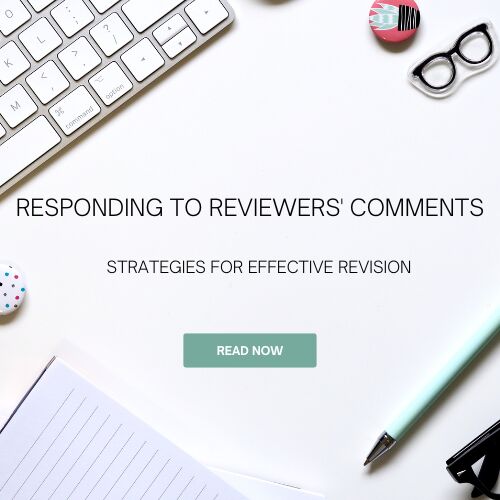Responding to Reviewers' Comments: Strategies for Effective Revision


In this article, we will look at strategies for responding to reviewers' comments and provide suggestions for effective revision.
The first step in responding to reviewers' comments is carefully reading and comprehending the feedback. Reviewers may provide constructive criticism, raise questions, or suggest improvements. It is essential to approach the comment with an open mind and a willingness to consider different perspectives. Take note of specific issues raised and identify common themes to guide your revision process.

When responding to reviewers' comments, it is crucial to maintain a professional and respectful tone. Remember that reviewers want to improve the quality of your work. Even if you disagree with some points, express your thoughts diplomatically and back them up with sound reasoning. Avoid becoming defensive or dismissive, as this can hinder the collaborative nature of the review process.

Reviewers' comments can be numerous and varied. Create a structured document or table that lists each comment with your corresponding response and planned revision to ensure a comprehensive response.
Address each comment individually, and explain how you plan to address the concern or incorporate the suggestion. Be specific and provide references or additional data, if necessary, to support your revisions.

Not all reviewers' comments may carry equal weight or require immediate attention. Prioritize the comments depending on their impact on the overall quality and clarity of your paper. Focus on addressing major concerns first, such as methodological issues, data analysis, or gaps in the literature. Develop a revision strategy that ensures you allocate sufficient time and effort to each area of improvement.

If you have co-authors, involve them in responding to reviewers' comments. Share the feedback, discuss possible revisions, and seek their insights. Collaborative efforts can lead to a more comprehensive and well-rounded response. Assign responsibilities to each co-author to ensure a balanced workload and maintain consistency in the revised manuscript.

When responding to reviewers' comments, aim to provide clear and detailed explanations of the revisions made. You should clearly state which changes were implemented and why. If you decide not to incorporate a particular suggestion, explain your rationale respectfully and provide a convincing justification. This transparency helps reviewers understand your thought process and demonstrates your commitment to addressing their concerns.

Consider seeking external input, such as from colleagues or mentors who are knowledgeable in your field. They can provide fresh perspectives and valuable insights into the reviewers' comments. Participating in discussions with others might help you improve your responses and discover potential gaps in your revision process.

As you revise your manuscript based on the reviewers' comments, aim not only to address their concerns but also to strengthen the overall quality of your work. Refine your arguments, enhance the clarity of your writing, and ensure that your research aligns with the scope and objectives of the journal. Use the feedback to elevate your manuscript to its fullest potential.

Before resubmitting your revised manuscript, thoroughly proofread and edit your work. Pay attention to grammar, spelling, and formatting errors. A polished and error-free manuscript demonstrates your attention to detail and professionalism, increasing the likelihood of a positive evaluation.

Finally, express gratitude to the reviewers for their time, effort, and valuable feedback. Acknowledge their contributions in improving the quality of your work. An appreciative and courteous tone fosters goodwill and may positively influence the reviewers' perception of your revised manuscript.

Responding to reviewers' comments is a critical step in the publication process that allows you to refine and strengthen your research. You can navigate this process successfully By understanding the feedback, maintaining professionalism, and implementing effective revision strategies. Embrace the opportunity for growth and improvement that reviewers' comments provide, and remember that the ultimate goal is to enhance the quality and impact of your research.
Publication Support Services

SITA Academy is a trusted and reliable publication support service that offers a wide range of comprehensive academic services. With a deep understanding of the challenges faced by researchers, authors, and students, SITA Academy provides expert guidance and assistance throughout the publication process. From manuscript editing and formatting to journal selection and submission, SITA Academy ensures that your work meets the highest standards of quality and professionalism. Their team of experienced professionals is dedicated to supporting individuals in achieving their scholarly goals by providing personalized and tailored solutions. With SITA Academy's publication support services, researchers, authors, and students can confidently navigate the complexities of academic publishing and maximize the impact of their work.
What services do we offer?
If you have any questions, inquiries, or would like to learn more about our services, please don't hesitate to reach out to us. Our dedicated team is ready to assist you.